How Do You View Yourself On Social Media?
Self Absorption, Self Indulgence, and Self-Love
Do you ever find yourself scrolling through Instagram posts sifting through beautiful women ‘models’, googly-eyed couples traveling the world, and hundreds of selfies? Amongst the thousands of likes and comments on everyone else’s photos you wonder, how does my Instagram account compare? Will I get enough likes or shares? Social media plays a big role in all of our lives - and, let’s face it - it is essentially unavoidable.
We can choose to use social media in a healthy and moderate way, or we can fall into the trap of instant (and temporary) gratification. First, I will define self-absorption, self-indulgence, and self-love with real life examples. The most fulfilling place to be is full of self-love. Once we get to a place of self-love, posting and interacting on social media becomes a much more enjoyable experience that will help grow our relationships in a positive way.
What is Self-Absorption?
When we think of someone who is ‘self-absorbed’, we think of someone who cares little for anyone but themselves. Maybe we think of someone we know who exclusively posts selfies on Instagram - someone who sincerely believes that the world revolves around them, and them alone. Being self-absorbed is kind of like being a balloon. Those who fall victim to self-absorption are typically desperate for external validation (hence the incessant selfie-posting). They blow themselves up like a big balloon by constantly reinforcing their external selves. They react to the world in a way that feeds their ego, placing a disproportionate amount of value on both appearance and the acceptance of others. Because they are focusing so much on themselves, they are unable to experience true empathy. It can be difficult to care about anyone else when you spend the majority of your time finding the perfect angle and lighting. A major wedge is often driven between friends and family, and any semblance of internal balance is thrown completely out of whack.
What is Self-Indulgence?
Self-indulgence will almost always result in personal consequences. Think about indulging in a massive piece of chocolate cake, or a day-long shopping spree. The cake may leave you with a stomach ache and sugar crash, and the shopping spree may leave you wondering how you’re going to pay your utility bill. When we indulge, it is typically because we have just undergone a period of self-deprivation. Denying ourselves something for a long period of time will understandably result in eventual immoderation. If we deprive ourselves of sweets for three months, we might soon find ourselves chin-deep in a chocolate cake. Indulging in yourself can be selfish (and it often is), because - until the period of indulgence is over - we probably won’t stop to consider how our behaviors might affect those around us. Additionally, we probably won’t stop to consider how we will be affected. The feelings of shame, guilt, and remorse that are bound to arise will only perpetuate the self-deprivation; thus, the vicious cycle will continue on.
And finally...
What is Self-Love?
Self-love, in short, is a healthy regard for your own well-being. It means taking the steps necessary to meeting your own needs, fostering spiritual and psychological health, and treating yourself with the respect and compassion that you deserve. It means taking well-deserved breaks, being with family, and taking a yoga class.
Now, self-love is not taking a yoga class so you can post pictures of your “rear end” in your new Lululemon pants, but taking a yoga class to nourish your body and rest your mind. Self-love is not always about self-improvement; it’s more about being okay with yourself no matter what. Understanding your inherent worth, and recognizing the positive light that you bring to the world around you. This feeling doesn’t always come easily, and I’ve found that it’s something I have to work at every day. But when it does come, it is honestly the best, most fulfilling feeling in the entire world. Self-love never comes when I’m comparing myself to others, thinking of all the ways in which I could be ‘better’, or living in a place of ego. It comes when I’m genuinely happy with who I am (imperfections and all). When I stop comparing, stop competing, and work on regaining balance and stability, I am practicing self-love.
Social Media & Yourself
Remember, social media can be inflated reality. Most photos and videos posted, to some degree, are edited to share the best version of ourselves. It’s important to take a step back and remind yourself that self-indulging or becoming self-absorbed in any online network can cause serious problems in all relationships. Of course, it is perfectly normal to seek some degree of external validation from time-to-time. Some days I wake up feeling amazing, and I want to share my wealth with the world. Other days, I’m a little bit harder on myself (the inner-critic has a field day from time-to-time), and I post a picture of better times, hoping that some positive comments and a plethora of likes will help me feel at least a little bit better. The newfound accessibility of social media makes it exceedingly simple to obtain the validation you crave. For the most part, there’s nothing wrong with this. Sometimes posting pictures of yourself on social media can be considered self-love. For example: you absolutely love the way you looked in the dress you wore to your friend’s wedding. It’s important to feel good about yourself! Go ahead and post the picture!
It is far easier to practice moderation and cease comparing when we are coming from a place of genuine self-love. Carve time out of your day to engage in self-care - be true to who you are, and listen intently to your personal needs. Though it may be difficult at first, practice and patience will inevitably lead to increased self-awareness, which will pave the road to sincere self-acceptance. Once we accept ourselves, external validation will become inconsequential.
Problems only arise when social media begins to tip the scale between self-love and the need to fill a void. Are you posting because you feel pretty, or are you posting because you deeply desire acceptance from your fans? Check your motives. And if you find that you are attempting to fill a void (one caused by a lack of self-love, self-acceptance, and comfort within your own skin), take the steps necessary to regaining balance and learning to authentically love yourself.


